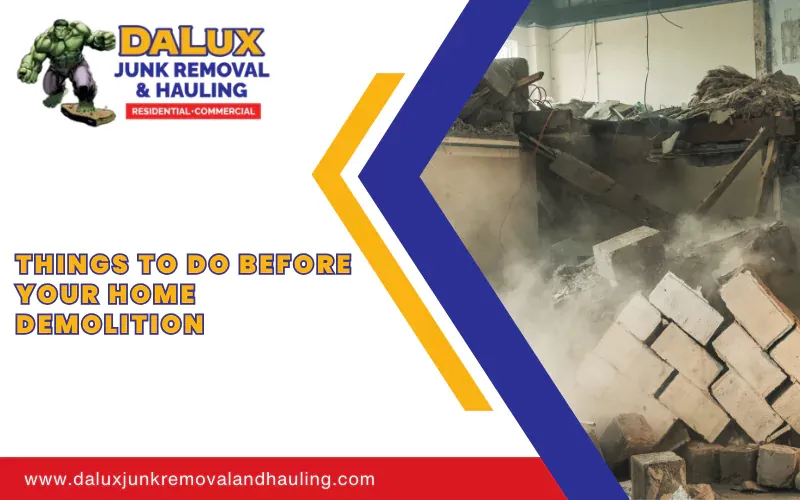Things To Do Before Your Home Demolition

Nothing is more exciting than tearing down your old home and building a new one, but even if it feels like a straightforward task, it is not.
Home demolition comes with a lot of things to keep in mind. From determining the demolition method to applying for necessary permits from the government bodies and choosing the right contractors for better and more reliable demolition, we will learn ten crucial things to do before your home demolition. So, keep reading this blog to learn more!
10 Things to do Before your Home Demolition
1. Determine the Right Demolition Method
Choosing the appropriate method is necessary for your home before starting any demolition project. There are different types, including mechanical, deconstruction, or implosion.
Each method has advantages depending on the structure, budget, and environmental concerns. Consulting with reputable demolition service providers ensures the best approach.
2. Prepare the Site
Once you choose the appropriate method, properly preparing the demolition site is crucial to ensuring safety and efficiency. Clear the area of personal belongings, furniture, and hazardous materials.
Establish clear zones for workers and equipment, and install barriers or warning signs to prevent unauthorized access. A well-organized site leads to smoother demolition.
3. Ask for Necessary Permits
Before demolition begins, obtain the required permits from your local government or relevant authorities. Demolition is a regulated process, and not having the proper permissions can result in legal issues, fines, or project delays. It’s necessary to apply early, as permit approval can take time.
4. Choose your Demolition Contractor
One more important thing to consider before demolition is choosing the right demolition contractor. It ensures your project runs smoothly and professionally.
Look for a contractor with experience, proper licensing, and good reviews. Interview several contractors, get multiple bids, and ask for references. The right contractor will be professional, safety-conscious, and efficient.
5. Inspect your Home Property
Conduct a thorough inspection of your property before demolition. Identify any hazardous materials like asbestos, lead paint, or mold. Note down your foundation, underground utilities, and structural risks. It will create a safe demolition plan and address any environmental concerns.
6. Inform your Neighbors about Demolition
Demolition can be disruptive, so inform your neighbors in advance. Provide details about the demolition schedule, expected noise, and potential impact on nearby properties. Keeping communication open helps avoid complaints and prepares everyone for the process.
7. Disconnect all your Utilities
Safety is a priority before the demolition process. So, disconnect all utilities like water, gas, electricity, and sewage to avoid accidents or damage throughout the development.
Coordinate with utility companies for proper shutdowns and let the professionals do their tasks. It is a critical safety step to prevent fires, explosions, or flooding.
8. Plan Evacuation
If you reside on the property or nearby, create an evacuation plan for the duration of the demolition. It should include temporary accommodation, access to essential services, and clear routes to leave the site in an emergency. Prioritize safety for all occupants and workers.
9. Find out Salvageable Materials
Before demolition, identify salvageable materials, such as bricks, doors, windows, or metal fixtures. Recycling or reusing these items can save money and reduce environmental waste.
Coordinate with the contractor to safely remove salvageable materials before the demolition work starts. You can also consider junk removal services to ensure your unwanted materials are effectively managed.
10. Have Future Plans Ready
After the demolition, you must move forward with new construction or site preparation. Have your future plans ready to minimize downtime. Whether rebuilding, selling the land, or repurposing the space, clear plans will help the transition from demolition to the next phase of your project.
Conclusion
Whether you plan to reconstruct your home or want to relocate and sell the land, these steps will help you stay organized when the demolition process starts.
Things to do before home demolition include knowing your property, finding the right contractor, making future plans, evaluating the evacuation process, and more. These steps will ensure a smoother, hassle-free demolition project and keep you at ease.
With the right demolition service provider, you can breathe easily, knowing they have the expertise to handle the project efficiently. Their knowledge and skills will ensure the demolition is completed safely, on time, and without complications, allowing you to focus on your next steps.
We offer expert guidance through every stage of your home demolition, from securing permits to choosing the appropriate method. Our experienced team ensures a safe, efficient process tailored to your needs.




